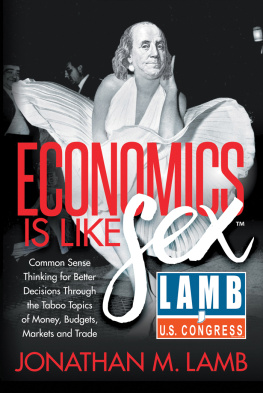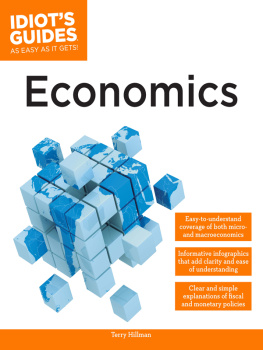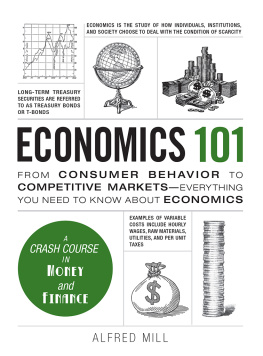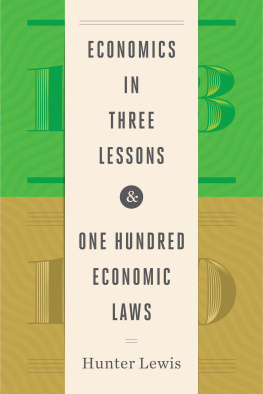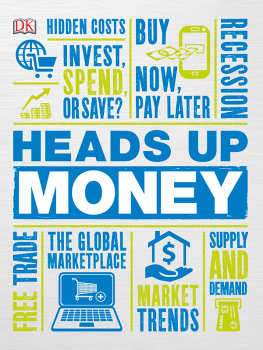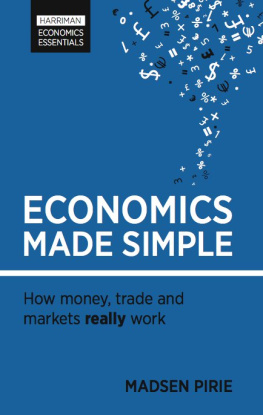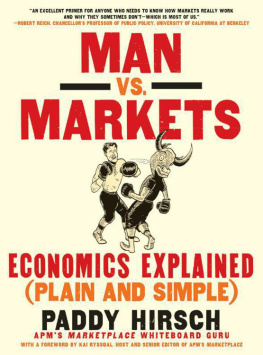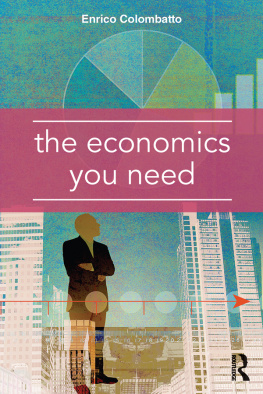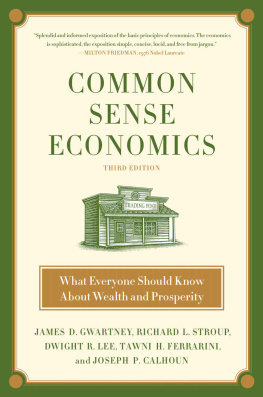ENDORSEMENTS
If anyone had to limit his lifetime study of economics to one book, Lambs effort would be a good choice. Lamb builds on a tradition going back to Henry Hazlitts Economics in One Lesson, explaining that economics isnt the dry calculus of the balance sheet. In this lively bookno equations, a handful of graphs, and plenty of real-world anecdotesyou realize we make economic choices all the time.
Resources are scarce. The unseen consequences of our actions are often overlooked. Unintended consequences abound. Affordable housing programs can make housing less affordable. Schemes to raise wages can throw people out of work. The Indian governments well-intentioned scheme to cut down on fatal cobra bites resulted in more cobras. Lamb even shows that if you cant beat the lottery, you can use human behavior to better your (still bad) odds.
The world would be a better place if everyone, including our political leaders, read this bookespecially our political leaders.
WILLIAM BILL STYRING III
Economist and former Senior Fellow, Hudson Institute
Economics is Like Sex
ECONOMICS
IS LIKE sex
Common Sense Thinking for Better Decisions Through the
Taboo Topics of Money, Budgets,
Markets, and Trade.
JONATHAN M. LAMB

NEW YORK
LONDONNASHVILLEMELBOURNEVANCOUVER
ECONOMICS IS LIKE sex
Common Sense Thinking for Better Decisions Through the Taboo Topics of Money, Budgets, Markets and Trade
2018 Jonathan M. Lamb
All rights reserved. No portion of this book may be reproduced, stored in a retrieval system, or transmitted in any form or by any meanselectronic, mechanical, photocopy, recording, scanning, or otherexcept for brief quotations in critical reviews or articles, without the prior written permission of the publisher.
Published in New York, New York, by Morgan James Publishing. Morgan James is a trademark of Morgan James, LLC. www.MorganJamesPublishing.com
Economics is Like Sex is a trademark of J Lamb Investments, INC.
The Morgan James Speakers Group can bring authors to your live event. For more information or to book an event visit The Morgan James Speakers Group at www.TheMorganJamesSpeakersGroup.com.
ISBN 9781683507222 paperback
ISBN 9781683507239 eBook
Library of Congress Control Number: 2017912750
Cover Design by:
Megan Whitney
Interior Design by:
Chris Treccani
www.3dogcreative.net

In an effort to support local communities, raise awareness and funds, Morgan James Publishing donates a percentage of all book sales for the life of each book to Habitat for Humanity Peninsula and Greater Williamsburg.
Get involved today! Visit
www.MorganJamesBuilds.com

ACKNOWLEDGEMENTS
I want to thank my family, friends, teachers, coaches, professors, business associates, advisors, mentors, and of course my wonderful employees. I must give special thanks to my wife, Mollee, the love of my life and the mother of my two wonderful boys. She has been supportive in my crazy life journey and all my business adventures and so instrumental during what amounted to over a two-year commitment to write this book. Without the love and support of my wife and boys during the rollercoaster ride of life and business, I surely would have lost my mind long ago.
A special thank you to Jennifer Hanchey, Bill Johnson, Teresa van den Barselaar, David Hancock, Jim Howard, and the team at Morgan James Publishingwithout them, this book would not have come to life, been edited, or wound up in the hands of those of you who want to have a better understanding of economics. A heartfelt thank you to Dr. Cecil Bohanon, professor of economics at Ball State University, a wonderful mentor and voice of encouragement who has always pushed me outside of my comfort zone. He taught me to believe that Iand anyone with a bit of economic understandingcan change the world for the better.
INTRODUCTION
C omedian Jerry Seinfeld has become one of the wealthiest celebrities in the world, with an estimated net worth of more than $870 million. He made a career out of finding and highlighting the humor in the obvious.
In one of Jerrys classic standup comedy sketches, he talks about a study hed read about public speaking. According to this study, speaking in front of a crowd was the number one fear of the average person. Number two was death. As he so elegantly puts it: For the average person, if you have to be at a funeral, you would rather be in the casket than giving the eulogy!
Lets play our own game of Would you rather? For those of you who can conquer the fear of public speaking, would you rather give a speech on sex... or a speech on how much money you earned last year and your net worth?
Wow, that is a hard one. Who would want to get up in front of a crowded room and talk about how much money they make? Thats because, for some of us, we think we make too much money. For others, we think we dont make enough. All of that is much more uncomfortable than talking about sex. Jerrys right. It would be more comfortable being in the casket!
Its estimated that Jerry Seinfeld made $43.5 million in 2016. If he was a working stiff, punching a timeclock 40 hours a week, he would be bringing home $20,913.46 per hour. Thats $348.56 per minute or $5.81 per second. Not too bad. Yet, for all that money, I have a feeling that Seinfeld himself wouldnt be very comfortable talking to a group of Indiana factory workers fighting to keep their families fed about how much he earns. Equally, it would be just as hard for those same factory workers to stand up at their 20-year class reunion and tell everyone how much money they made last year.
I know, because Ive been on both sides of that money speech, and thats why Ive written this book. I hope to give you insights into the world of economics as it relates to the taboo topics of money, budgets, markets, and trade. With these nuggets, youll have the confidence to talk about any of it, to anyone, regardless of the setting.
I have undergraduate degrees in economics, risk management, and insurance. I went on to pursue a masters and PhD in economics, only to drop out to start the first of seven businesses I now have under my belt, before coming full circle to return to the classroom to earn my MBA.
After earning my undergraduate degrees, I became a commodities trader, working on a trading floor and managing an electricity trading book of business with billions of dollars in assets.
Ive started seven businesses, had a few that didnt turn out as planned, a few that were extremely successful, and I am still running and building two of them, either of which could become the next wildly successful, world-changing company or fizzle out and never turn a profit.
Ive invested my entire life savings and retirement funds in ventures, only to lose it all. But I have other investments that have paid off, and like other entrepreneurs, I hope my current companies will pay off in the future and earn all that lost capital back and then some.
The journey of entrepreneurship is filled with the highest of highs and the lowest of lows. Ive been in both camps more times than I care to remember. And I wouldnt have it any other way.
Ive not had a real paycheck since 2012. As a business owner and consultant, Ive gone months, sometimes even years, without earning any income. Ive spent thousands of hours and dollars researching and writing this book, had business ventures come and go, and overseen commercial real estate deals that took, and will take, years to produce any profits.

